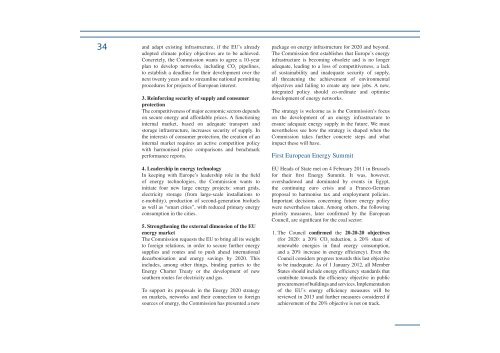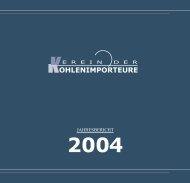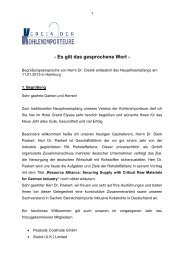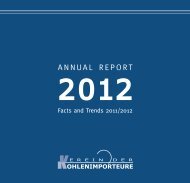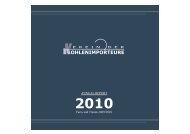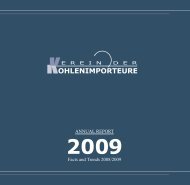Annual Report 2010 - Verein der Kohlenimporteure eV
Annual Report 2010 - Verein der Kohlenimporteure eV
Annual Report 2010 - Verein der Kohlenimporteure eV
Create successful ePaper yourself
Turn your PDF publications into a flip-book with our unique Google optimized e-Paper software.
34<br />
and adapt existing infrastructure, if the EU’s already<br />
adopted climate policy objectives are to be achieved.<br />
Concretely, the Commission wants to agree a 10-year<br />
plan to develop networks, including CO 2 pipelines,<br />
to establish a deadline for their development over the<br />
next twenty years and to streamline national permitting<br />
procedures for projects of European interest.<br />
3. Reinforcing security of supply and consumer<br />
protection<br />
The competitiveness of major economic sectors depends<br />
on secure energy and affordable prices. A functioning<br />
internal market, based on adequate transport and<br />
storage infrastructure, increases security of supply. In<br />
the interests of consumer protection, the creation of an<br />
internal market requires an active competition policy<br />
with harmonised price comparisons and benchmark<br />
performance reports.<br />
4. Lea<strong>der</strong>ship in energy technology<br />
In keeping with Europe’s lea<strong>der</strong>ship role in the field<br />
of energy technologies, the Commission wants to<br />
initiate four new large energy projects: smart grids,<br />
electricity storage (from large-scale installations to<br />
e-mobility), production of second-generation biofuels<br />
as well as “smart cities”, with reduced primary energy<br />
consumption in the cities.<br />
5. Strengthening the external dimension of the EU<br />
energy market<br />
The Commission requests the EU to bring all its weight<br />
to foreign relations, in or<strong>der</strong> to secure further energy<br />
supplies and routes and to push ahead international<br />
decarbonisation and energy savings by 2020. This<br />
includes, among other things, binding parties to the<br />
Energy Charter Treaty or the development of new<br />
southern routes for electricity and gas.<br />
To support its proposals in the Energy 2020 strategy<br />
on markets, networks and their connection to foreign<br />
sources of energy, the Commission has presented a new<br />
package on energy infrastructure for 2020 and beyond.<br />
The Commission first establishes that Europe’s energy<br />
infrastructure is becoming obsolete and is no longer<br />
adequate, leading to a loss of competitiveness, a lack<br />
of sustainability and inadequate security of supply,<br />
all threatening the achievement of environmental<br />
objectives and failing to create any new jobs. A new,<br />
integrated policy should co-ordinate and optimise<br />
development of energy networks.<br />
The strategy is welcome as is the Commission’s focus<br />
on the development of an energy infrastructure to<br />
ensure adequate energy supply in the future. We must<br />
nevertheless see how the strategy is shaped when the<br />
Commission takes further concrete steps and what<br />
impact these will have.<br />
<br />
<br />
for their first Energy Summit. It was, however,<br />
overshadowed and dominated by events in Egypt,<br />
<br />
proposal to harmonise tax and employment policies.<br />
Important decisions concerning future energy policy<br />
were nevertheless taken. Among others, the following<br />
priority measures, later confirmed by the European<br />
Council, are significant for the coal sector:<br />
1. The Council the 20-20-20 objectives<br />
(for 2020: a 20% CO 2 reduction, a 20% share of<br />
renewable energies in final energy consumption,<br />
and a 20% increase in energy efficiency). Even the<br />
Council consi<strong>der</strong>s progress towards this last objective<br />
to be inadequate. As of 1 January 2012, all Member<br />
States should include energy efficiency standards that<br />
contribute towards the efficiency objective in public<br />
procurement of buildings and services. Implementation<br />
of the EU’s energy efficiency measures will be<br />
reviewed in 2013 and further measures consi<strong>der</strong>ed if<br />
achievement of the 20% objective is not on track.


